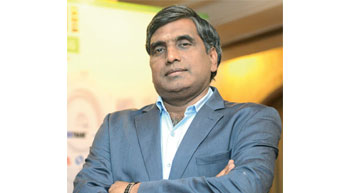Smart City' is a popular term that has been linked to most, rather, all the upcoming urban big-ticket projects ù be it private or public. Simply put, a Smart City is a social settlement that is near-perfect and is self sustaining.
FlashNews:
Inox Clean Energy, RJ Corp Enter Africa’s IPP Market, Target 2.5 GW by FY2029
Best Pills for Erection: Myths, Facts, and Smart Choices
Best Pills for Erection: Audience‑Specific Guidance with Safety Disclaimers
DIAL Launches Family@DEL: First Family‑Centric Travel Initiative at an Indian Airport
India’s SDHI Lands Landmark Oman Defence Ship Deal
Air India Unveils First Line‑Fit Boeing 787‑9, Signals Bold Global Transformation in 2026
Vizhinjam Expansion Strengthens India’s Maritime Competitiveness: Sonowal
Tata Power Odisha Discoms Secure Top National Rankings for Third Consecutive Year
SDHI Secures $227 Million Chemical Tanker Deal, Revives India’s Commercial Shipbuilding
India’s Energy Transition Sets Global Pace: Pralhad Joshi at Davos
IWDC Clears ₹15 Billion Projects to Boost Green Mobility, Cargo and River Tourism
World Bank Approves $815 Million Financing for Tata Power-DGPC Dorjilung Hydropower Project in Bhutan
Indian Railways Deploys Humanoid Robot ASC ARJUN at Visakhapatnam for Smart Station Security
India’s Power Grid Crosses 500,000 Circuit Km, Marks 71.6% Growth Since 2014
India Inc Optimistic on Growth, Flags Infrastructure, Defence and Export Priorities: FICCI Survey
NHAI, Konkan Railway Ink MoU to Boost Integrated Road‑Rail Infrastructure Development
DGCA Digitises Pilot Licensing with Electronic ATPL Services to Strengthen Aviation Ecosystem
Power Minister Calls for Financially Strong Discoms to Drive India’s Energy Future
BLR Airport Launches Gate Z, India’s First Social Lounge Redefining the Airport Experience
Tag: Make In India
Energising India
The power sector in India is set for explosive growth following the stated policy objective of the Union government to provide 24x7 power to all households by 2019.
Recovery from demonetisation is a foregone conclusion
There is definitely going be a short-term impact of demonetisation on the industry. The November 2016 sales of two-wheelers, four-wheelers and the automotive industry in general has taken a beating.
The warehousing sector is going to experience a sea change in its structure
With the total warehousing space requirement in the country´s top seven markets expected to grow from 621 mn sq ft in 2016 to 839 mn sq ft by 2020, the warehousing sector has shown tremendous traction in the past couple of years. Further, investment in warehousing can provide an opportunity of realising returns in the range of 10-24 per cent per annum.
GST will help companies reduce logistics costs by up to 1.5percent
According to me every move has an advantage and a disadvantage. The business success depends on the ability of a company to factor in variables and continue to stand firm.
GST will reduce the share of the unorganised sector in warehousing
The GST is a value-added tax that will replace all other indirect taxes in India. One purpose of the GST is to make taxes ´destination´ based rather than origin based, or ´efficiency´ based rather than ´regulation´ based.
Indian logistics saw better growth while globally there was muted demand
Big is definitely better for the warehousing services focusing on serving organised sectors. Economies of scale, cheaper land costs, more automation and higher labour utilisation are some of the key benefits.
ABB wins order to supply 1600 transformers to Indian Railways
ABB has won an order from Alstom to supply 1600 traction transformers for 800 new electric freight locomotives in India.
Lack of sufficient domestic project financing options remains a concern
Steve Edwards - Chairman and CEO, Black & Veatch, shares his perspective on the Indian infrastructure market, his company´s offerings, and the shortcomings in the current EPC contract mechanism in the country.
Automobiles to drive Make in India
Girish Shankar, Secretary, Ministry of Heavy Industries and Public Enterprises has said that the Government of India aims to make automobiles manufacturing the main driver of the ´Make in India´ initiative, as it expects the passenger vehicles market to reach 9.4 million units by 2026, as highlighted in the Auto Mission Plan (AMP) 2016-26.










